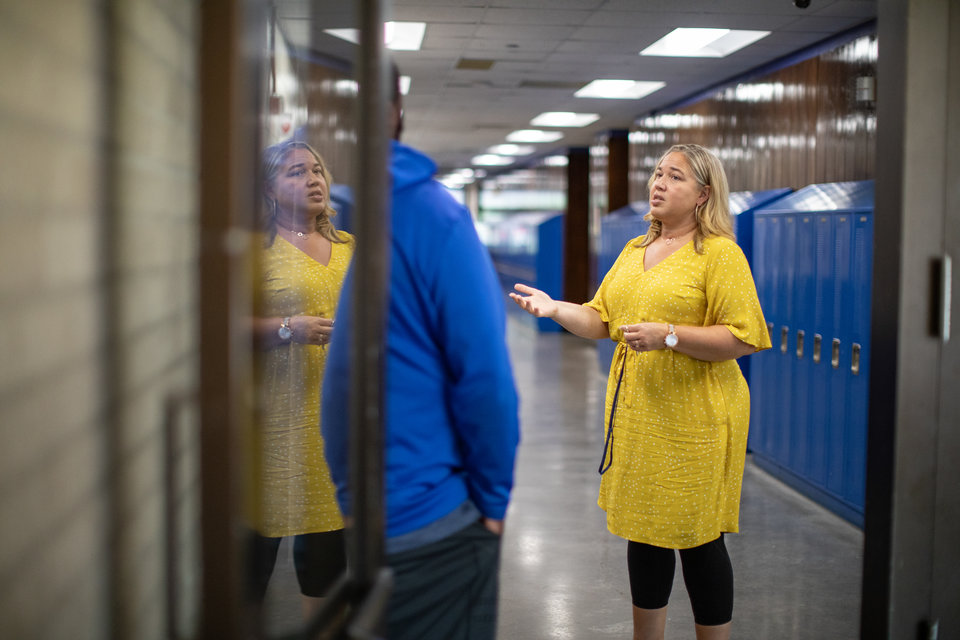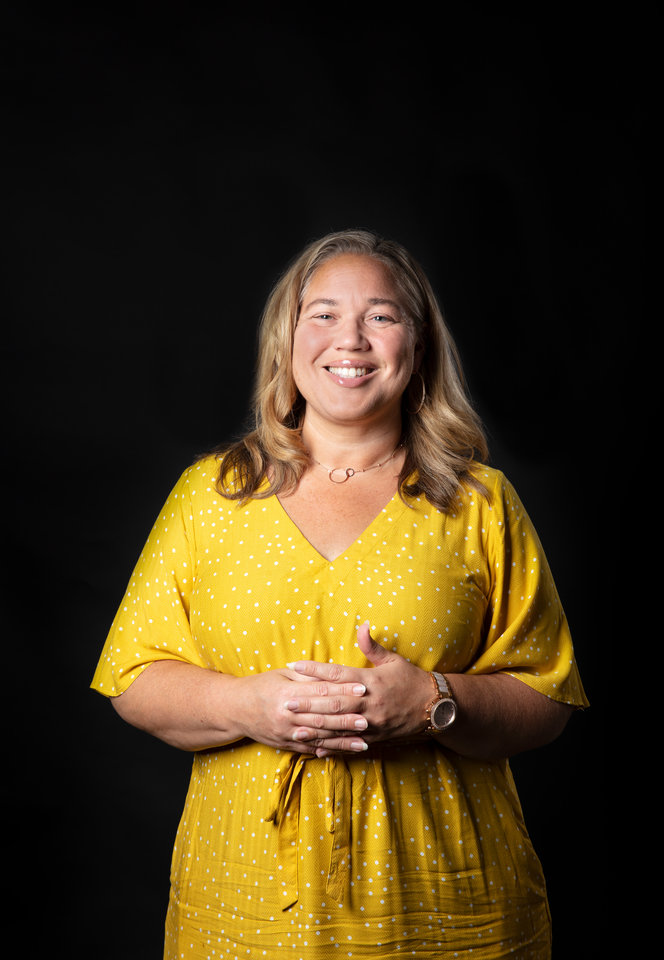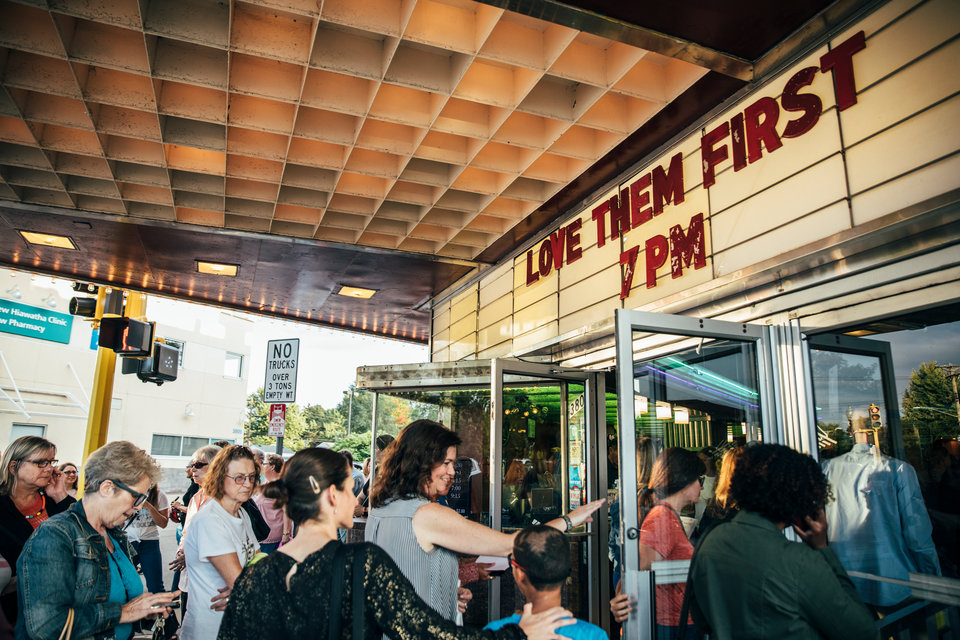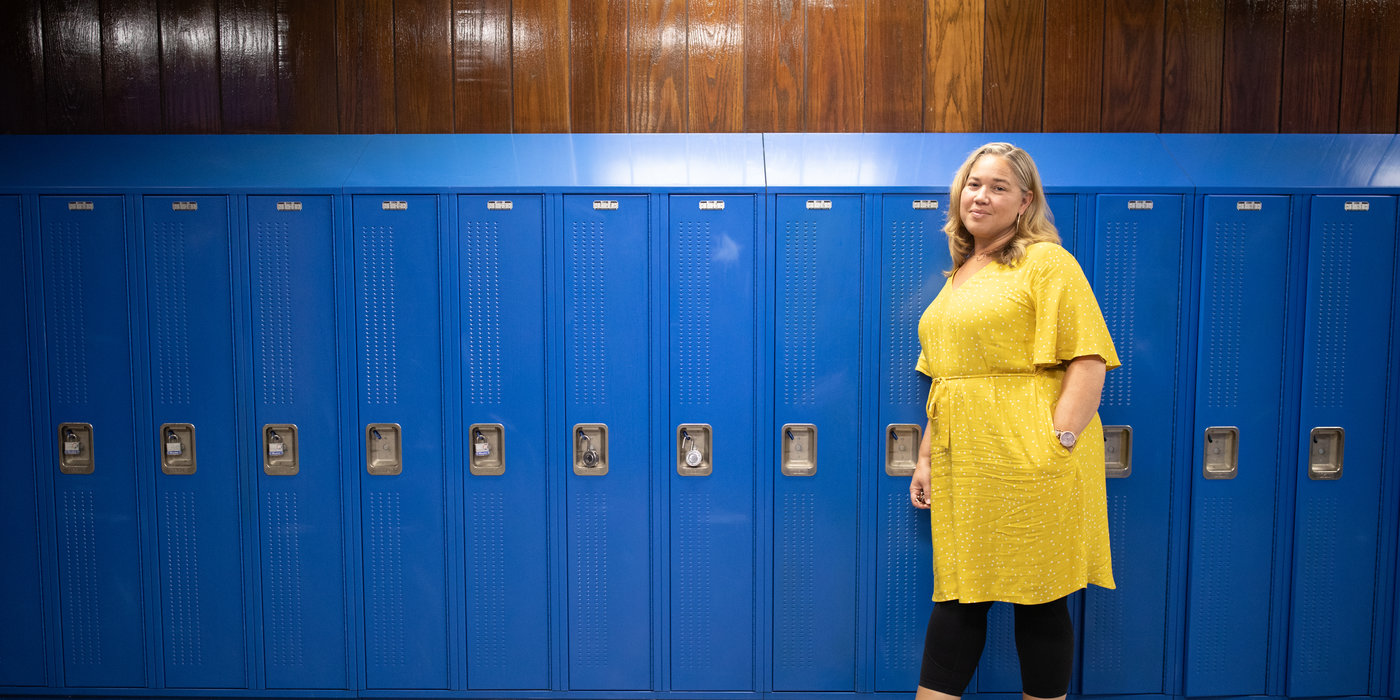As principal of Lucy Craft Laney Community School, Mauri Melander Friestleben reminded her school community daily it was “the brightest, the most intelligent and definitely the best looking of all” over the intercom.
It’s this kind of spirit Friestleben ’97, ’00 MA, ’05 EdS infused into the core of Lucy Laney during her decade there, first as assistant principal and then as principal. She led the staff of the North Minneapolis elementary school in creating a place where children are celebrated, nurtured and championed. She fought to decrease suspension rates, and they have dropped significantly in the last five years. She sought to increase test scores, which have continued in an upward trajectory. Most importantly, she advocated for her students who now beam with pride when talking about their school.
Those efforts haven’t gone unnoticed. The Lucy Laney community was the topic of a full-length documentary, “Love Them First: Lessons From Lucy Laney Elementary,” produced by KARE 11. The film originated as a series of news stories developed by KARE 11 reporter Lindsey Seavert and photojournalist Ben Garvin. The film captured the hearts of audiences at the Minneapolis/St. Paul International Film Festival where it premiered last spring, selling out its entire run and winning awards for best Minnesota-made documentary and audience choice. Since then it has taken home accolades from a variety of film festivals and aired on KARE 11 along with multiple TV stations across the country. It recently won an Alfred I. duPont-Columbia Award - sort of like the Pulitzers for broadcast.
In August, Friestleben announced she was leaving Laney to become principal at nearby North Community High School. Since Laney is a pathway school to North, plenty of familiar faces anticipated her arrival.
“I cried my eyeballs out when I pulled into (and out of!) the Laney parking lot my last day there,” said Friestleben, soon after making the announcement in August. “But I am more than ready to step into North. The idea of stepping in to see my former Laney babies through their high school years gives me such joy I could scream! I’m thrilled to be a part of their lives again in this way.”

North High School Principal Marui Friestleben ’97, ’00 MA, ’05 EdS, talks to a coworker in North Community High School.
Creating bonds
A few years ago, Nicole Powell ran into Friestleben at an Open Streets celebration. While the two of them hadn’t seen each other for years, they still had a bond. When Powell was an eighth grader in the late '90s, Friestleben had been her reading teacher.
“She made a lasting impression; she was one of the coolest teachers in the school. All the kids gravitated toward her,” Powell recalled. “She was able to relate to us. She opened up those doors and allowed us in without judgment.”
As an adult, Powell was searching for a new school for her third-grade son. Friestleben encouraged her to visit Laney. Powell took her up on the offer even though she hadn’t heard positive things about the school in the past.
“When I went there, everybody said ‘Hi.’ They were all smiling and happy,” Powell said. “I thought, 'This isn’t real. There’s no way these kids are happy to see the principal and all the staff is glad to be here.’ You don’t see that in school, right? I was sold. I signed up my son right then and there.”
At Laney, Powell’s son was excited to go to school and his behavioral issues improved. Powell, whose daughter is also at the school, said her children felt at home at Laney and so did she.
“I can be at work and know my kids are good and not being judged or labeled,” she said. “The teachers are actually taking time and getting to know the students. They learn how to address, relate and create a boundary and relationship with them.”
Powell is looking forward to when her children go to North Community High School and reunite with Friestleben in the future.
“She is fighting for what she believes in,” Powell said about Friestleben. “She doesn’t see the bad in people and always encourages you to be great. She’s an awesome, lovely person. I’m glad she’s in my life.”

Carving a path
When Friestleben was an undergraduate at St. Thomas, she was an aspiring journalist with dreams of being an international reporter.
“As a biracial teenager from Minneapolis, St. Thomas was definitely a culture shock for me, but it absolutely helped shape who I am to this day,” she said.
During her junior year, life threw her a curve ball. On the day she was offered a prestigious internship with the Associated Press in Atlanta, she also found out she was pregnant.
“In that moment I had a lot of decisions to make,” Friestleben said. “I decided that I wanted to give my child everything I possibly could. I wanted to give her consistency, stability and predictability. I wanted to protect her with my life.”
She walked away from the internship and turned her focus to her other College of Arts and Sciences major – sociology. After she gave birth, she finished her senior year. When she needed to find an internship for her sociology degree, she chose one at City Songs, an afterschool program where children learned about music and performed concerts.
“I was really surprised the kids listened to me,” Friestleben said.
As she was planning for life after college, she took journalism off the table knowing she wouldn’t have the flexibility required for the profession. Then she heard about the Collaborative Urban and Greater Minnesota Educators of Color (CUE) Scholarship Program, a partnership between the University of St. Thomas and the state of Minnesota dedicated to increasing teacher diversity.
“The more I thought about it, the more I thought, ‘This makes sense for being a mother. This makes sense for my schedule,” she said. “So I threw my hat in the ring.”
After completing the CUE program, she continued her education at St. Thomas, going on to earn her master’s degree in education and later, an education specialist degree. For a few years, she was an adjunct teacher at the School of Education.
In her professional career, Friestleben was a middle-school teacher, a vice principal of a charter school and an assistant to two superintendents before finding a home at Laney in the late 2000s. While she asked to specifically be placed at a school in North Minneapolis, she was unsettled when she learned it was Laney.
When she was four, Friestleben suffered abuse while under the care of neighbors near Laney. For years she avoided that part of North Minneapolis because it triggered anger and sadness.
“There were a dozen schools I could've been placed at in North Minneapolis, and I got placed at one that's right by that house,” she said. “I now know that it was very purposeful.
“I realized that maybe that’s what my purpose was at that point – to be a wounded healer,” she said. “So my students and their families could see that I had come from similar circumstances and I had come out on the other side.”

Making Lucy Laney a home
When Friestleben arrived at Laney, where a majority of students are African American and live below the poverty line, she started chipping away at everything from school schedules and rituals to routines and expectations of behavior. She took discipline seriously, taking students out of school and to their homes when they refused to follow the rules.
At the same time, she was pushing the staff to make Laney a place children wanted to be. She told them they needed to create an environment that draws kids in, not one from which they didn’t mind being removed. So they started infusing more fun into Laney by throwing last-minute popcorn parties, bringing in cookies and planning field trips. They also held the students to high standards.
“It’s the same kind of mentality as creating an environment and an atmosphere in the school that says, ‘You are safe here, you are loved here, you are welcome here, you are supported here,’” she said. “There are high standards here and high expectations, but you’ll also be welcomed back to try again.”
Lisa Pawelak said the amount of respect Friestleben has for people brings out the best in them. Pawelak was Lucy Laney's assistant principal before taking over as principal after Friestleben moved to North Community High School.
“The kids don’t want her to see them not at their best,” said Pawelak, who worked with Friestleben for a decade and considers her a good friend. “The kids don’t want to disappoint her. When she is around, their chests puff out a little bit, they stand up taller because she sees them as the greatest, and they want to be seen that way by her.”
Friestleben didn’t try to create a safe, loving place at school because the kids didn’t have one at home; she did so because they didn’t have one outside of their home, she said.
“Some people think, ‘Oh, you have mostly black children in your school - they must live in poverty, they must have a sad home life,’” she said. “Some of them do, some of them don’t. What’s sad is the way they are treated the minute they walk outside of their front door. Yes, the school needs to be their second home, but it’s not always because they don’t have a home. In the country and the culture they live in, anywhere outside of home can be an unsafe place. At any point in time, they live in an environment or an atmosphere where there is violence. When I think about some of my Laney families, I need to know that when they step into our building they feel that level of safety and they feel that level of comfort.
“Staff is standing at the doors to greet them. We get on the buses every morning to say good morning,” she added. “We make it clear that regardless of what’s happening around the school or in their personal lives – even in their own homes – they are coming into a space that is truly theirs.”
In the film “Love Them First,” a wise student named Sophia looks at the camera as she talks about her love for Laney. “That’s what makes this place really special, because as you look around you, you realize that even though there’s lots of dangerous things over by this area, a lot of students still like to call this place home and I’m one of them. I’m proud to be one of them.”
“This is our block. This our community,” Friestleben said. “This is our neighborhood and there are people who are messing it up. We’re not going to let them mess it up for us.”

Movie goers line up to enter a screening of the documentary “Love Them First” at the Riverview Theater in south Minneapolis.
The movie
The award-winning “Love Them First” captures memorable moments from the 2017-2018 school year at Lucy Laney where Friestleben helped students and staff navigate the highs and lows their community experienced.
“I hope people see what belief and faith can do,” Friestleben said, reflecting on the film. “Just having faith in God, first of all, but then faith in humanity.
“I hope people see the flaws of our educational system,” she continued. “I hope people are moved to change it and change the practices and policies that continue within our current educational system.”
The documentary’s name was inspired by the numerous times Friestleben says “love them first” when it comes to educating students. But that means so much more than just giving out hugs, she said.
“When I say that, I mean love them like you would love your own children, but that doesn’t mean they can come into your space or your home and do whatever they want. It means you raise them up as if they are your very own, and you raise them up with high standards and high expectations,” she said.
A new beginning
Now that Friestleben is at North Community High School, she’ll have a new school to navigate, new staff to inspire and new students to motivate. However, Lucy Laney always will have a place in her heart, and her legacy there won’t be forgotten.
“The teachers do a fantastic job of creating climate and culture that Mauri modeled for us from the top down,” Pawelak said. “The kids are accepted for all that they bring and they are loved for that. They are not seen as deficits. We don’t view them as something that needs to be fixed. They’re whole and pure just the way they are. It’s our job to maintain that purity and to help them see the brilliance that’s already in them and to draw that out.”
Not only was Laney a place where Friestleben grew as an educator, it’s also where she found happiness in her personal life. It was where she first met now-retired police lieutenant Michael Friestleben when he was inspector of North Minneapolis’ Fourth Precinct. He had stopped by the school to update her on a situation happening in the neighborhood and kept returning to check in.
“The staff used to say all the time, ‘We’ve never had this much police presence in our school,’” she said. “He finally asked me out a year later and the rest was history.”
The couple, who were wed a few years ago, has four daughters (two of them were married over the summer) and live in Brooklyn Center.
While Friestleben created a home for students at Laney, for her, home is wherever her mother is. She also feels a different sense of home when she’s with her father, who is African American, and her siblings on the East Coast. With them, she feels at peace racially and culturally.
With her husband she now has another place to call home.
“We live with our 12-year-old daughter and our German shepherd,” she said about her home with Michael. “I see the Mississippi every time I wake up. I have a sign when you walk in the house that says ‘This is my happy place’ because that’s exactly what it is.”


